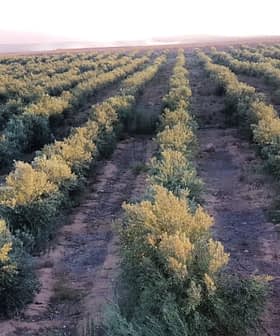The coastal town of Henties Bay in Namibia offers tourists an idyllic vacation with long stretches of clean beaches for walking and fishing as well as golf courses and tennis courts. Soon it will be offering olive oil produced from locally grown olives.
In 2013, Henties Bay became home to 1,000 olive trees under a new initiative called the Olive Project. A year later, in November 2014, the project doubled its count of olive trees by adding another 1,000 trees, which were brought in from South Africa.
Gys Cilliers, factory manager of a seal-processing factory at Henties Bay that initiated the project, expressed excitement for the plan to cultivate, harvest and press olives for olive oil in Henties Bay itself.
The Olive Project started as a way to provide year-long work to the 96 seasonal employees of the seal factory, who only work from July to November during the seal harvest season. As the size of the olive farm grows, the Olive Project is set to employ an additional 40 full-time workers by the end of this year, most of who will be women, promises Cilliers.

Seals in Henties Bay: A seal factory in Namibia branches out to olive oil production in the off-season.
Olive oil production is not new in Namibia. Rolf Heiser, a pioneer olive farmer in Namibia, started his farm, Hartebeestteich-Süd near Hochfeld, in 1991 with 700 trees. Now the farm boasts more than 6,000 trees, produces table olives and extra virgin olive oil.
Ruheleben Estates is another successful olive farm that was started in 2004 by Wim van der Plas. It produced the first batch of olive oil in 2009 using a state-of the art Italian olive press that can process 250 liters per hour. Seven olive cultivars are grown and processed on the farm.
Swakop River Olives, also produced at the Ruheleben Estates, received a “Platinum Award for the best Namibia Product” in November 2011.
An effort to increase olive plantation in Namibia, which has the environment and climate suitable for growing olive trees, is gaining momentum. Last year, the Erongo regional council and Namsov Fishing Enterprises provided funding to launch an olive farm in the Okombahe settlement.
Olive farms such as these will not only increase production of olives and olive oil in Namibia but also offer full time employment to local communities.








